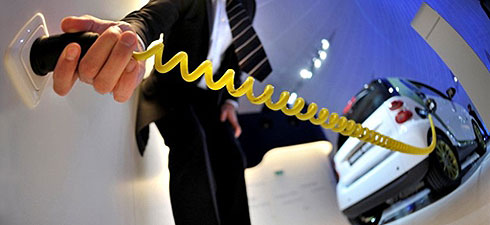We do not know when it started and where it first broke out. What is certain is that electro-fever has long since hit Central Europe. And the International Motor Show (IAA) in Frankfurt has got it bad: not a single make can do without an electric vehicle (EV) of its own. Volkswagen intends to start turning out a fully-electric compact car by 2013, Mitsubishi as early as the end of this year. And BMW is planning its own line of EVs.
It is astounding how fast industry, engineers and political decision-makers have reached a consensus. The Federal Government envisions a million EVs on Germany’s roads within ten years, Siemens deems as many as 4.5 million within the realm of possibility. These figures are electrifying even conservative forecasters. But the forecasts do not hold water. The idea did not really gain any momentum of its own till sales started nosediving all over the world. Yesterday’s whimsy has become today’s big business brainwave.
Cars with a clean conscience
The electric car is, above all, a projection of all manner of wishful thinking and a pretext for subsidy requests. Electric vehicles do not burn any fossil fuels or directly emit any pollutants, and they are quiet. “Better Place” is the name of a start-up sired by ex-SAP manager Shai Agassi to equip whole fleets of EVs in California and Israel. The announcements are driven by marketing strategies: the technology itself is still in its infancy.
For one thing, the energy density of existing lithium ion batteries is not yet sufficient for longer hauls. No-one knows how well they hold up under long-term use, how many recharging cycles the cells can bear and under what loads. The battery packs are heavy and high-maintenance. That puts certain constraints on the use of EVs and, more to the point, makes them very expensive. Were the manufacturers to charge real prices, they would have to ask well over €40,000 for a compact car.
Naturally, the prices will go down, and the batteries’ energy density up, once they go into production. But the costs will remain enormous for manufacturers, who will have to develop completely new concepts. A car without gears needs a whole new architecture: lightweight design to compensate for the heavy weight of the batteries, so the bodies will be made of carbon fibre instead of steel. And that is not a trivial makeover: it is a revolution in carmaking.
Never without government incentives
Then there is the infrastructure: it will take years to put up a sufficient number of charging stations in big cities at the very least. Sizeable fleets will have to be intelligently managed to avoid overloading the power grids. And the whole thing makes ecological sense only if the requisite power is generated using renewable sources.
Without massive government funding there will be no market for the electric car either. Mass producers like VW and Opel will be particularly hard hit next year when the cash-for-scrap scheme comes to an end, so it is pretty clear which fat luxury cars will be heading for Berlin to demand heftier backing for the electric car.
But even a bad case of electro-fever can be treated: one need only recall the past promises of “fusion power” and “fuel cell technology”. To this day, industry has yet to make a single cent on those much-touted breakthroughs. Electric cars are likewise liable to prove a bottomless subsidy pit.
RESEARCH
Not as squeaky clean as they seem
French president Nicolas Sarkozy has personally taken the matter in hand: France is to convert to the electric car. Even if it means quashing doubts about the ecological merits of electric vehicles (EVs). A study by the French Environment and Energy Management Agency Ademe, for instance, got slightly retuned before publication, reports Libération, because its findings on EVs were not quite flattering enough. The study shows that, while EVs do put a damper on exhaust emissions, they are not systematically less polluting than conventional cars. “The bottom line on CO2 emissions from EVs is close to that of class B cars” (i.e. superminis/subcompacts), concludes Ademe. “If you recharge your vehicles with electricity from plants that run on coal, fuel oil or natural gas (…), the equation is reversed in favour of diesel or petrol vehicles,” explains the French daily. On Wednesday, 23 September, the French government is to announce a “clean vehicles” plan featuring a €5,000 rebate on every EV purchase.
Was this article useful? If so we are delighted!
It is freely available because we believe that the right to free and independent information is essential for democracy. But this right is not guaranteed forever, and independence comes at a cost. We need your support in order to continue publishing independent, multilingual news for all Europeans.
Discover our subscription offers and their exclusive benefits and become a member of our community now!












